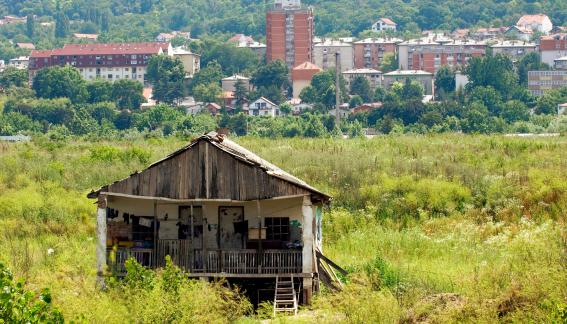The previous post, this post, and the next four were provoked by an article that made two assertions I found troubling: one, that there is no consensus among researchers on the consequences of inequality, and two, that evidence of a “causal relationship” between income inequality and health is unclear. In the last post, I discussed those assertions and quoted Daniel Goldberg on whether health behaviors determine health. To continue …
Ground control, we have causation
Over the past few months, since I first read that annoying article, I keep coming across accounts that offer evidence of the harms that result from inequality (particularly in childhood), as well as actions that doctors and politicians are willing to take to address the problem. We’ve known for some time that there was a correlation between poverty and health. Now we’re finally discovering the mechanisms, the causation.
- Inequality Begins at Birth by Jeff Madrick:
[T]here is new biological evidence that a high-stress environment for very young children does not simply affect cultural and psychological conditions that predispose the poor to failure; it can also affect the architecture of the brain, changing the actual neurological functioning and quantity of brain matter.
- AAP: Toxic Stress Threatens Kids’ Long-term Health in The Journal of the American Medical Association:
Epidemiological studies had long associated disadvantaged childhoods with poorer outcomes, but now biological research is helping to reveal the underlying mechanisms.
The resolution urged the state [California] to support policies aimed at reducing children’s exposure to traumatic events while investing in treatment and other support for those who have witnessed community violence or other adverse childhood experiences.
Those exposed to multiple adverse experiences, including the death of a relative, domestic violence, exposure to substance abuse, are more likely to have a stroke, cancer or diabetes as well as more likely to experience depression or be an alcoholic.
- The Lifelong Effects of Early Childhood Adversity and Toxic Stress in Pediatrics (emphasis added):
Advances in fields of inquiry as diverse as neuroscience, molecular biology, genomics, developmental psychology, epidemiology, sociology, and economics are catalyzing an important paradigm shift in our understanding of health and disease across the lifespan. This converging, multidisciplinary science of human development has profound implications for our ability to enhance the life prospects of children and to strengthen the social and economic fabric of society. … [T]his report … examines extensive evidence of the disruptive impacts of toxic stress, offering intriguing insights into causal mechanisms that link early adversity to later impairments in learning, behavior, and both physical and mental well-being. … It calls for pediatricians to serve as both front-line guardians of healthy child development and strategically positioned, community leaders to inform new science-based strategies that build strong foundations for educational achievement, economic productivity, responsible citizenship, and lifelong health.
Of course, I also regularly come across evidence of how the problem of inequality is not being addressed.
- “We’ve ended up in an age where every fault in your stars is in yourself” Public Policy and the Past
- “If you believe that net worth is a reflection of merit, then any attempt to curb inequality looks unfair.” James Surowiecki
- “[T]he mental health industry mostly wants to do what is easiest and most profitable, not what is most urgently needed. Its selfish interests do not coincide with society’s responsibility to care adequately for its most vulnerable.” Allen Francis
That there’s a correlation between inequality and poor health is old news. It’s not good news that there is causation. What’s good is that scientific evidence can now become part of an argument for policies that address inequality, especially during childhood. Arguing that inequality didn’t contribute to the economic crisis or that it doesn’t interfere with economic growth should no longer suffice as reasons to maintain the status quo. At least I hope they won’t. We’ll see.
More follows
Next up, a brief observation from Tony Judt, then a three-part series on how it is we came not to care about inequality. (1) Some thoughts from Pierre Rosanvallon on how attitudes towards inequality have changed since the American and French revolutions. (2) A longer historical view of attitudes towards caring for the poor from Mitchell Dean’s Governmentality. And (3) an indictment of an elitist class by William Deresiewicz in his book Excellent Sheep.
Related posts:
Interrogating inequality: An annoying article
Interrogating inequality: Tony Judt
How we came not to care: Rosanvallon
How we came not to care: Historical trends
How we came not to care: Oligarchy of the elite
What pediatrics can teach us about addressing adult social determinants of health
Two children visit their doctors: Social class in the USA
The enduring benefits of saving children
Image source: Human Capital and Economic Opportunity Global Working Group
Resources:
Elizabeth Gudrais, Rebooting Social Science: The interdisciplinary Tobin Project addresses real-world problems, Harvard Magazine, July-August 2014
Jeff Madrick, Inequality Begins at Birth, The New York Review of Books, June 26, 2014
Bridget M. Kuehn, AAP: Toxic Stress Threatens Kids’ Long-term Health, The Journal of the American Medical Association, August 13, 2014
Jack P. Shonkoff et al, The Lifelong Effects of Early Childhood Adversity and Toxic Stress, Pediatrics, December 26, 2011
thehistorian, What are the costs of economic atomisation?, Public Policy and the Past, June 29, 2014
James Surowiecki, Moaning Moguls, The New Yorker, July 7, 2014
Allen Francis, The Hall Of Shame: Who Is Failing The Severely Ill?, Saving Normal, September 3, 2014



Sorry, comments are closed for this post.